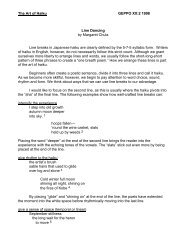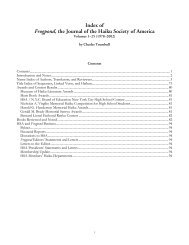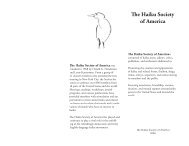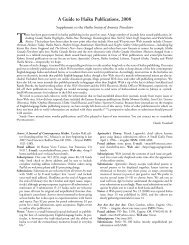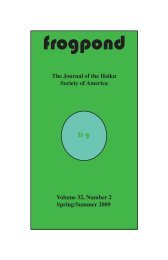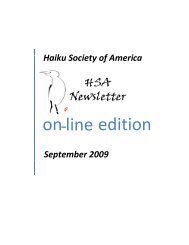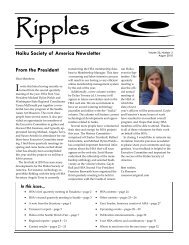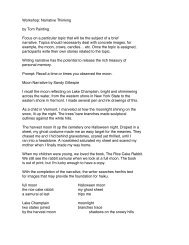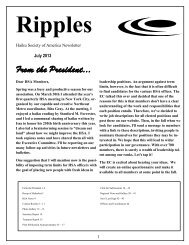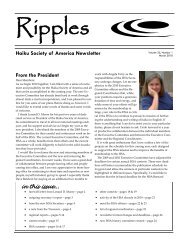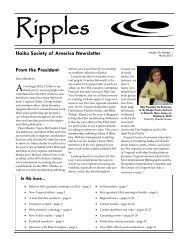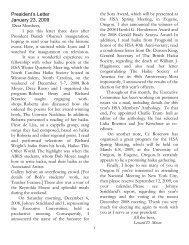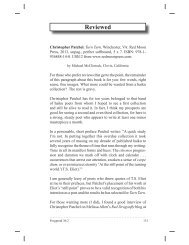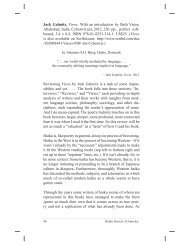Frogpond 34.3 • Autumn 2011 (pdf) - Haiku Society of America
Frogpond 34.3 • Autumn 2011 (pdf) - Haiku Society of America
Frogpond 34.3 • Autumn 2011 (pdf) - Haiku Society of America
You also want an ePaper? Increase the reach of your titles
YUMPU automatically turns print PDFs into web optimized ePapers that Google loves.
eing bound by it, how to use haiku as a tool not only for<br />
expression but for the navigation <strong>of</strong> a life. I still read Sappho<br />
and Homer, I still read Su Tung Po and Dante, and I still<br />
read Bashō and Issa and Buson. These are wellspring poets<br />
for me. Bashō’s teachings about writing are as relevant and<br />
provocative now as they were when he was alive: “poetry is<br />
a fan in winter, a fireplace in summer;” “To learn <strong>of</strong> the pine,<br />
go to the pine;” “Don’t imitate me, like the second half <strong>of</strong> a<br />
melon.” His navigation <strong>of</strong> the creative life and poverty, his<br />
restless curiosity, his losses, even his death was exemplary,<br />
really—Bashō’s last spoken words take the point <strong>of</strong> view<br />
<strong>of</strong> the flies his students were trying to chase from the room.<br />
They show how supple and compassionate a poet’s sense <strong>of</strong><br />
existence can be.<br />
CE: The Ink Dark Moon, it’s been said, helped inspire what’s<br />
become a working community <strong>of</strong> tanka writers, both in the<br />
U.S. and in Australia. How do you see your role here, as a<br />
poet, translator, and teacher?<br />
JANE: I might not have published this Bashō piece at all, except<br />
that people who’d heard it or read it in manuscript kept<br />
telling me both that they loved the translations and that it<br />
does bring something new to the table. That it was helpful.<br />
That’s my hope for anything I do, though I write my own<br />
poems outside <strong>of</strong> any hope, or intention, beyond the needs <strong>of</strong><br />
that particular poem and moment. I translated Bashō’s haiku<br />
freshly mostly because I found I couldn’t use other people’s<br />
translations for the original talk—not because they weren’t<br />
good, just because, once you’ve done some translating, you<br />
understand how much more intimate an entrance to a poem<br />
that is. I am tremendously lucky that my old co-translator,<br />
Mariko Aratani, agreed to re-join me for this project. As a<br />
teacher <strong>of</strong> poems, I’ve been investigating the deep workings<br />
<strong>of</strong> poetry for almost forty years now, both Japanese and Western.<br />
I believe in the happy accidents <strong>of</strong> cross-fertilization and<br />
that different traditions have always informed one another.<br />
There are two essays in Nine Gates: Entering the Mind <strong>of</strong><br />
Poetry that talk about Japanese poetics and translation. My<br />
. . . . . . . . . . . . . . . . . . . . . . . . . . . . . . . . . . . . . . . . . . . . . . . . . . . . . . . . . . . .<br />
<strong>Frogpond</strong> 34:3 67



